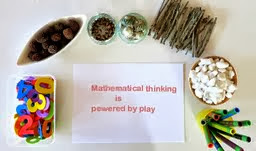Over the years, Mathematics has evolved rapidly. These revolution that injected changes to the curriculum, ushered in over the past decade, were propelled by findings from the researchers that children grasp math concepts more effortlessly when they are given opportunities to investigate, explore ideas and concepts through problem solving as compared to memorizing equations, otherwise known as rote learning. These explorations in classrooms as well as their home should mimic the act of doing mathematics in the real world.
Mathematical thinking is powered by play. Young children learn by doing. As a teacher or the caregiver, we are responsible for organizing the child's environment and providing stimulating materials. For example the use of real things (buttons, bottle caps, shoes) from the environment to practice counting and patterning. Playing and learning should be like sampling a relaxed buffet meal. As a teacher, we facilitate by providing the balanced menu. The child's job is to choose the experiences and activities while we tempt them with exciting possibilities that sparks their interest to explore and understand maths concepts effectively. It's also vital to recognize that each child develops at his own pace.After all, Albert Einstein started talking very late and he failed mathematics early in high school. Yet,of course, he went on to become the greatest scientist of his age.
Go ahead, keep it fun!


